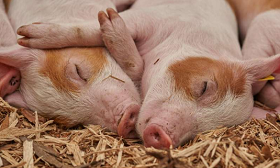
A small team of researchers from Scotland's Rural College, the University of Veterinary Medicine Vienna and Queens University in the U.K., has found that better social skills in pigs lead to shorter rank fights. They have published a paper in Royal Society Open Science describing experiments they conducted with domesticated pigs and what they found.
n the animal kingdom, fighting between members of a species or a group within a species is a common way to establish rank. But it can also lead to problems for the participants if they are injured. In this new effort, the researchers wondered if animals in the wild have a mechanism for mitigating injuries, perhaps by shortening the duration of bouts. They further wondered if the degree of socialism had an impact on rank fight length. More specifically, would animals that have learned to socialize well with other animals engage in shorter and less injurious bouts? To find out if this might be the case, the team studied domesticated pigs, which are known to engage in rank fights.
The experiments involved allowing 32 piglets to visit a neighboring farm whenever they wanted to socialize with other animals, including pigs. Another 32 piglets were restricted to their own farm where they were only ever allowed to interact with their mothers. When the piglets were eight weeks old, they were placed in pens with another piglet. The researchers observed them to see how they interacted. Rank fights between pigs generally involve sniffing, walking around one another, nudging, tussling with snouts, and on some occasions, actually biting one another. A few minutes later, one of the pigs will give up and show submission to the other, establishing the rank level between the two of them.
The researchers report that for the well-socialized pigs, the rank fights lasted on average just three minutes. Those that had not been allowed to socialize while growing up tended to fight longer—on average, one minute longer. They also found themselves injured one-third more often than the socialized pigs. The findings indicate that socialization in pigs allows for less severe, shorter rank fights, preventing injury among group members.
Source : Phys.org